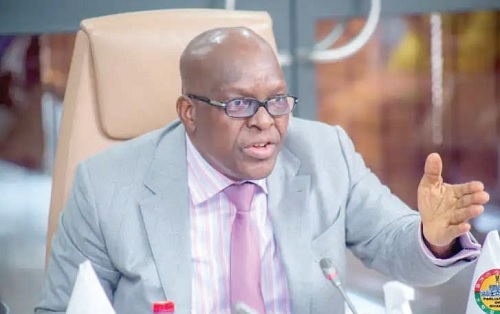
Parliament and the Divine
The behaviour of Ghana's Members of Parliament (MPs) has become increasingly disruptive and confrontational, reaching a point where the Speaker, Rt Hon. Bagbin, has publicly asked for divine intervention to resolve the ongoing conflicts.
While some might consider this request extreme, it highlights a more profound problem: the urgent need for MPs to conduct themselves with greater decorum and to ensure the effective functioning of Parliament.
The notion of divine intervention, while metaphorical, can be seen as a call for higher moral standards within Parliament. It encourages MPs to conduct themselves in ways that align with parliamentary decorum and promote the interests of Ghana as a whole.
However, it is crucial to recognise that relying solely on spiritual or divine solutions could distract from the practical responsibilities MPs have to self-regulate their behaviour and engage in constructive collaboration.
The recent disturbing incident involving a physical altercation among MPs during the vetting of ministerial nominees highlights the urgency of addressing these conflicts.
Such incidents not only tarnish the image of Parliament but also erode public trust in its ability to govern effectively.
To prevent similar occurrences in the future and restore confidence in parliamentary governance, a multifaceted approach is necessary.
Commendable step
A commendable step has already been taken: the Speaker's establishment of a seven-member committee to investigate the recent events.
This inquiry should aim to reconcile conflicting accounts from all parties involved, ensuring fairness and transparency in its findings.
Moreover, a thorough review of the Standing Orders and relevant constitutional provisions is essential.
This process will help clarify the Speaker's powers and uphold the rule of law, thereby reducing ambiguities that may exacerbate conflicts in the future.
Additionally, addressing the entrenched political divisions within Parliament is crucial.
Fostering a culture of cross-party collaboration through mediation and conflict resolution training would significantly enhance the quality of dialogue and cooperation among MPs.
Furthermore, reforms in parliamentary committees should be considered, particularly the introduction of balanced questioning protocols for nominees, to promote fairness and respect during proceedings.
Ultimately, the strength of Ghana's Parliament relies on robust leadership from the Speaker, Committee Chairs, and the leaders of both the Majority and Minority caucuses.
Instilling discipline and prioritising the integrity of Parliament over partisan interests will be essential in elevating the dignity of this esteemed institution, thereby encouraging respectful discourse.
It is equally important for citizens to hold their representatives accountable for their conduct.
By balancing moral guidance with concrete actions, Ghana can strengthen its democratic foundations and enhance public confidence in Parliament as an institution.
Spirit of disorder
The issue of disruption within Parliament recently made public by Speaker Bagbin, which he believes can only be addressed by divine intervention, is not the only example of attempts to invoke the name of God in seeking to control the behaviour of some of Ghana’s MPs in the country’s notoriously divisive legislature.
The Speaker announced plans on February 10, 2025 to hold the next annual prayer meeting inside Parliament.
The aim, he stated, is ‘to exorcise any spirit of disorder influencing MPs’. His announcement followed the ‘chaos’ during the recent sitting of the Appointments Committee, as noted above.
The disorder, according to the Speaker, underlines deeper issues affecting MPs’ conduct in Parliament. He sought to contrast what he regards as MPs’ appropriate behaviour in their religious settings with their allegedly ‘unruly actions’ in Parliament.
In addition, Rt Hon. Bagbin claimed that parliamentary disorder frequently erupts whenever his deputies preside over proceedings, contrasting with what he called “relative calm” when he is in charge.
The concerns the Speaker raises bring to our attention three interesting issues. First, the notion that ‘chaos’ in Parliament is linked to the presence of evil spirits. Second, the idea that having the annual prayer meeting in Parliament would get rid of them. Third, the claim that increased prayers to God would change for the better MPs’ ‘unruly’ behaviour.
The 1992 Constitution does not touch on the issue of what should be God’s presence in Parliament.
However, given the fact that Ghana is a secular liberal democracy then religion of any kind should not be an important factor in running Parliament nor should it comprise a formal or consistent area of political business.
Second, which God is Rt Hon. Bagbin referring to? He is a Roman Catholic and presumably, when he thinks of or speaks about God, he is referring to the Christian God. What of Muslim MPs, followers of African Traditional Religions and religious ‘nones’?
How are they supposed to react to the idea of having God as a parliamentary controlling force?
The bottom line is that controlling MPs or any other politicians is the job of people, such as the Speaker; the responsibility should not be God’s.
Speaker Bagbin is passing the buck on this issue, and the idea that God can fix things in Parliament or elsewhere in politics is mistaken and goes against the cherished ideals of Ghana’s proud secular democracy.
The writers are Emeritus Professor of Politics, London Metropolitan University, UK and a Political Scientist
